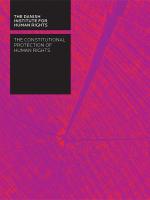
The Constitutional Protection of Human Rights
In recent years, new constitutions have been discussed, drafted and adopted in many places of the World. The constitutional protection of human rights is one of the core elements of these processes. In Latin America, Bolivia and
Ecuador have been at the forefront of highly participatory drafting processes. As a result, the new constitutions now include detailed catalogues of human rights and indeed a further development of rights, such as the recognition of the right to water. In Europe, Norway and in Asia, Nepal are currently
debating their constitutional frameworks and the place to be given to human rights protection.
With the concentration of constitutional work in Egypt, Morocco, Tunisia and Yemen, the idea of publishing a brief on the Constitutional Protection of Human Rights came about through conversations with partners in the Middle East and North Africa. The Danish Institute for Human Rights has addressed human rights protection in constitutions and law-making both through research and concrete advice since the 1990s.
While there will always be specificities to any constitution, there are also some fundamental conditions that should be met in order to ensure an effective and efficient protection of human rights at the domestic level. The purpose of this brief is thus to highlight the fundamental elements forensuring an effective and efficient protection of human rights within a
constitutional framework. It is meant to provide the reader with an overview of the important discussions that may arise in the course of drafting, amending or analysing a constitution.
This brief focuses on the principles of and human rights at large, remedies to humanrights violations and relations between national and international human rights law. Specific issues such as citizenship, nationality or minority rights are not addressed here as these areas require more thorough analysis. This brief builds on extensive empirical research of constitutions, constitutional processes and jurisprudence from most parts of the World.
Each chapter provides an analysis, examples of constitutions and spheres of discussion that should help pinpoint and address human rights and related issues in constitutional processes. The target groups for the brief are professionals that work occasionally with constitutional processes but who are not specialists in constitutional law.
We strive to make the pdf versions of our publications etc. accessible for screen readers. If you experience any problems, please contact Digital Editor Stine Juhl Nielsen on stni@humanrights.dk
